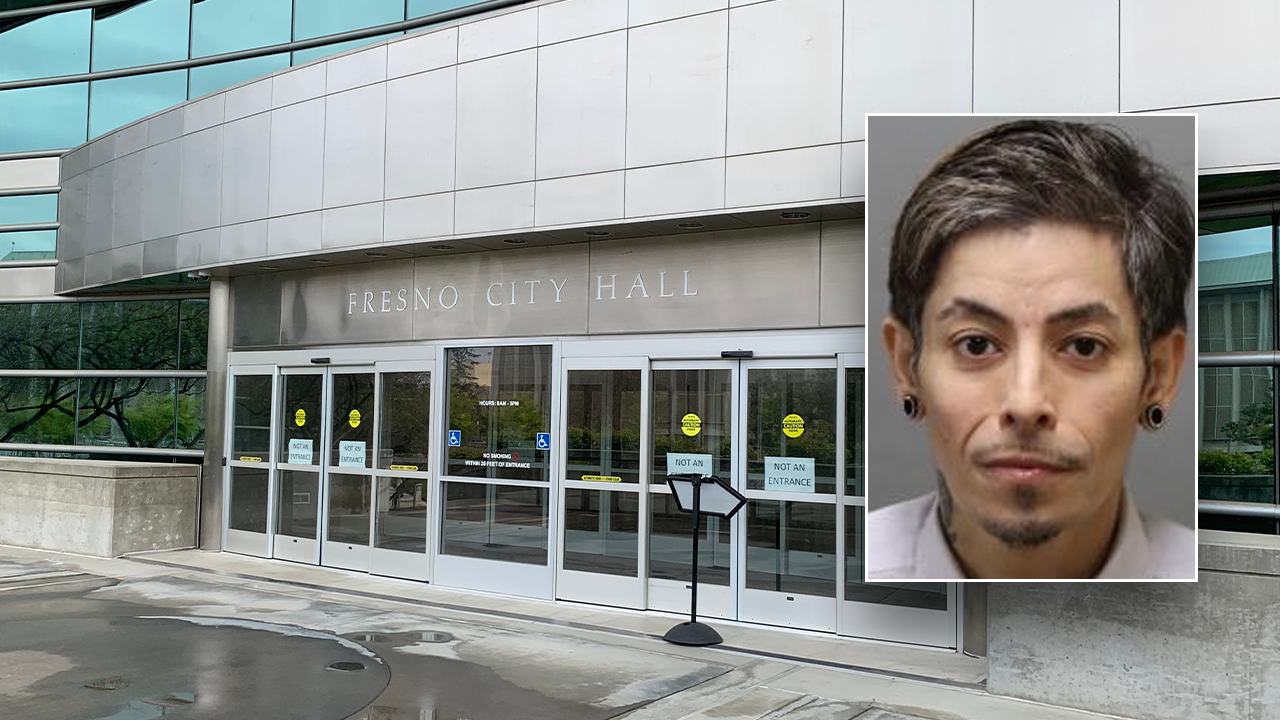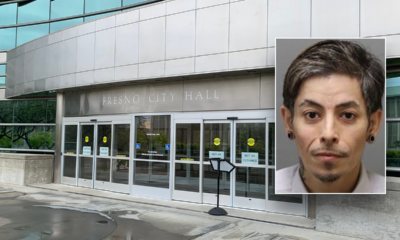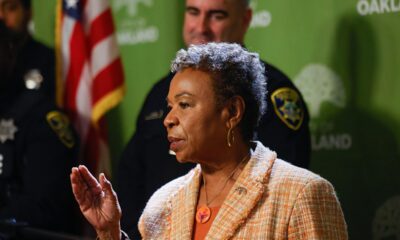West
More than 500,000 Californians demand voting overhaul, back ‘straightforward’ ID law

NEWYou can now listen to Fox News articles!
FIRST ON FOX: More than 500,000 California voters have signed a petition to amend the state’s constitution to enforce voter ID laws for all elections, leaders of a coalition called Californians for Voter ID told Fox News Digital.
“We had a dog that voted in the last couple elections in Costa Mesa,” Republican California state Sen. Tony Strickland told Fox News Digital in a Wednesday phone interview about California’s persistent voter integrity concerns. “We don’t clean up our voter rolls. There are so many times where people move, college kids go out of state, or people move and they don’t clean up the voter rolls. And we mail out to everybody, and so you have a lot of live ballots with ballot harvesting.”
“Our initiative will now clean up the voter rolls throughout the state,” he added.
Strickland, who represents a district that includes portions of Orange and Los Angeles counties along the Southern California coast, is helping lead the charge to collect more than one million petition signatures from California voters in order to force the issue on the ballot for the 2026 election. The signature collection kicked off Oct. 1, meaning the group collected support from more than half-a-million voters in a one-month span.
CALIFORNIA REPUBLICANS LAUNCH VOTER ID BALLOT PUSH, NEED 875K SIGNATURES BY DEADLINE
More than 500,000 California voters have signed a petition to amend the state’s constitution to enforce voter ID laws for all elections. (Al Drago/Bloomberg via Getty Images)
The Californians for Voter ID initiative specifically would amend California’s constitution and require voters to present government-issued IDs before casting a ballot in all future elections in the state.
California voters would be required to present a government-issued ID before voting in-person, or provide the last four-digits of a government ID if voting by mail. Election officials, under the initiative, would be required to verify a voter’s citizenship to ensure only legal residents register to vote or receive ballots.
Democrats historically have opposed voter ID laws over claims it disenfranchises minority voters, while conservatives argue it will ensure only legal residents are able to cast ballots and further bolster voter integrity. Thirty-six states have voter ID laws already on the books, though such laws vary and have some exceptions.
Californians for Voter ID leaders, however, say the issue is not a partisan one, but an effort to protect democracy for all Americans.
The lead strategist for the effort, Ryan Erwin, told Fox News Digital that recent polling shows 70% of Californians across the political spectrum support elections requiring IDs to vote, while underscoring the outpouring of support that has led to more than 500,000 signatures already secured.
“We are on pace to qualify for the ballot faster than any measure in the history of California,” Erwin said. “Voter ID is a commonsense way to build trust in the election process by requiring election officials to use government data to verify citizenship and voter eligibility, while also requiring identification for every vote counted.”
OBAMA ENDORSES NEWSOM CALIFORNIA REDISTRICTING PROP 50
“Californians of all political stripes are eager to improve trust in the system by eliminating abuse and errors while protecting every eligible vote,” he continued. “The volunteer effort is overperforming, we have signatures from all 58 counties, and are on pace to qualify well ahead of our goal.”
The group needs a total of 874,641 in order to land the initiative on the 2026 ballot in the Golden State, but is aiming to secure 1.2 million signatures to ensure the support is certified by county officials who will go through the data before it is permitted to land on the ballot. Organizers have until March to secure the needed signatures before potentially getting on the ballot — with Strickland reporting he’s confident they will get the needed support.
State Sen. Tony Strickland, a Republican from California, is confident they will get the needed support to get the voting initiative on the ballot. (David Paul Morris/Bloomberg via Getty Images)
“You have to be a citizen in order to register to vote,” Strickland said of the nuts and bolts of the amendment itself, calling it “very straightforward.”
“You have seven forms of documentation, you get to choose what form of documentation that you use in terms of the last four digits of whatever the documentation is,” he said. “When you go to the polls, you show your ID, and if you mail in your ballot, you show that proof of the documentation of the last four digits that you choose.”
“The other part of this initiative is we have a mandatory audit (to) all 58 counties of their election rules after every election,” he added.
Strickland is no stranger to voter ID efforts in the deep blue state, including championing a voter ID ballot initiative in Huntington Beach, California, in 2024, when he served on the city council. Voters approved the amendment forcing voters to show their ID when casting ballots in local elections, but the California Court of Appeals struck down the law in November.
If the statewide voter ID effort is approved by voters on the ballot in 2026, local lawmakers will be compelled to comply with voter ID laws set forth in the initiative.
TRUMP SAYS HE WILL REQUIRE VOTER ID WITH EXECUTIVE ORDER
Strickland said the massive amount of support the initiative already has received is on par with a 1978 initiative, Proposition 13, “when the legislature was out of touch with the people, the people rose up” and passed the ballot measure that fundamentally changed how property taxes were assessed and limited in California.
Strickland also compared it to the successful recall of former Democratic Gov. Gray Davis in 2003 — California’s first and only successful recall of a governor. Strickland was the first legislator to endorse Davis’ recall as energy and economic woes rocked the state.
If the California voter ID effort is approved by voters on the ballot in 2026, local lawmakers will be compelled to comply with voter ID laws set forth in the initiative. (Gary Leonard/Getty Images)
“Speaking around the state of California, I would equate what’s going on today with voter ID and voter integrity to those two movements in California,” he said.
The California state senator also praised California Republican Assemblyman Carl DeMaio and his group, Reform California, for their ongoing efforts championing voter ID laws in the state, describing DeMaio’s work as “relentless.” Strickland and DeMaio are joint authors of the voter ID push and have teamed up to meet with voters at various events to rally support, including a recent event in Santa Barbara, where the people couldn’t get through the door because it was so packed, he said.
VOTER ID LAW IN TEXAS WINS AT APPEALS COURT AFTER BIDEN ADMIN LAWSUIT
California’s voting laws have fallen under the Trump administration’s critical eye just this week, with White House press secretary Karoline Leavitt posting to X Tuesday that the Golden State has the “WORST laws for securing elections in the entire nation.”
President Donald Trump said Tuesday that California is facing a “very serious legal and criminal review” over claims the state’s special election to redraw congressional district lines was mired in corruption. Voters passed the measure to redistrict on Tuesday, with Gov. Gavin Newsom celebrating
“California doesn’t require voters to show photo ID before casting a ballot – despite nearly 90% of Americans supporting photo ID laws,” Leavitt posted in a lengthy message detailing issues she sees with the state’s election process. “California uses universal mail-in-balloting, which we know is extremely vulnerable to fraud and abuse. In the 2024 election alone, California mailed nearly 10 million mail-in ballots that were never returned.”
The Heritage Foundation keeps a database compiling cases of known voter fraud — namely cases that have led to criminal convictions — and found California has at least 68 cases of voter fraud since 2001. The examples include individuals who fraudulently used absentee ballots for duplicate votes, non-resident voting and fraudulent voter registration.
The database shows other states, such as Illinois and Texas, have more instances of confirmed voting fraud, at more than 100 cases each, while other states such as Nebraska have seen only at least three instances of confirmed voter fraud in recent years.
Press secretary Karoline Leavitt takes a question from a reporter during the daily briefing at the White House on Nov. 4, 2025. (Andrew Harnik/Getty Images)
Newsom has countered the claims, arguing California’s elections are fair and secure while slamming Trump over his remarks.
“He also announced today, right when polls were opening, that this election was rigged. Of course, those are familiar words. It’s exactly what Donald Trump said after Jan. 6, that day of love, where he tried to light democracy on fire, he tried to wreck this country,” Newsom said Tuesday after polling showed the state passed Proposition 50 to redistrict.
“I hope it’s dawning on people the sobriety of this moment,” Newsom continued. “What’s at stake. Tonight, as I said, is an extraordinary moment for our party, but again, it’s an extraordinary moment affirming those principles. Our Founding Fathers did not live and die to see the kind of vandalism to this republic and our democracy that Donald Trump is trying to perpetuate.”
A ballot initiative championed by Gov. Gavin Newsom to redistrict California’s congressional lines passed in a special election Nov. 4, 2025. (Justin Sullivan/Getty Images)
For Strickland, he championed that the voter ID initiative will move ahead with the help of grassroots efforts and a little “homework.”
“I’m going to speak to two groups today, and I give them homework assignments, just saying, ‘Please take those packets. We’re planning to go get 50 signatures, go get 100.’ And I use a sports analogy. I say, in baseball, if you hit two times out of every 10, you’re barely making the major leagues. You’re probably going down the minor leagues. But if you get three hits every 10, you’re an all-star. And I’m asking everybody to get that extra hit in life,” Strickland said.
Read the full article from Here

Utah
Utah man dies of injuries sustained in avalanche in Big Cottonwood Canyon

SALT LAKE CITY (KUTV) — A man died after he was caught in an avalanche in Big Cottonwood Canyon over the weekend.
A spokesperson for the Salt Lake County Sheriff’s Office confirmed on Thursday that Kevin Williams, 57, had died.
He, along with one other person, was hospitalized in critical condition after Saturday’s avalanche in the backcountry.
MORE | Big Cottonwood Canyon Avalanche
In an interview with 2News earlier this week, one of Williams’ close friends, Nate Burbidge, described him as a loving family man.
“Kevin’s an amazing guy. He’s always serving, looking for ways that he can connect with others,” Burbidge said.
A GoFundMe was set up to help support Williams’ family.
BE THE FIRST TO COMMENT
_____
Wyoming
Casper veteran David Giralt joins race for Wyoming U.S. House seat

West
Registered sex offender’s city council bid sparks fury as officials explore blocking his path

NEWYou can now listen to Fox News articles!
A registered sex offender convicted in a child sex abuse material case is seeking elected office in California — launching a campaign for Fresno City Council amid fierce backlash and renewed questions about whether someone with his record should hold public office.
Rene Campos, a Fresno native required to register as a sex offender, has announced plans to run for the District 7 seat on the Fresno City Council.
Campos was charged in 2018 with possession of child sex abuse material, according to court records. He has said he pleaded no contest to a misdemeanor charge and is now a registered sex offender.
His opponent, Nav Gurm, says the campaign has transformed what should be a local race focused on infrastructure and public safety into a national controversy.
Rene Campos in a 2018 booking photo related to a child sex abuse material possession case. Campos, now a registered sex offender, has launched a campaign for Fresno City Council. (State of California Department of Justice)
“His candidacy is a slap in the face to families and children in Fresno,” Gurm told Fox News Digital. “They deserve a councilmember who can show up at their schools and in their neighborhoods without restriction.”
In a statement to Fox News Digital, Campos defended his candidacy, arguing he has met all legal requirements.
“I satisfied every legal obligation imposed under the laws this state enacted for accountability and rehabilitation,” Campos said.
CONVICTED KILLER KEPT IN POLICE OVERSIGHT ROLE AS CITY COUNCIL DISMISSES CONCERNS OVER PUBLIC SAFETY
The entrance to Fresno City Hall in Fresno, California. The District 7 City Council seat is up for election amid controversy surrounding a registered sex offender candidate. (James Ward, Visalia Times-Delta via Imagn Content Services, LLC)
“If those same laws can be set aside when politically inconvenient, then we are not debating one candidacy — we are testing whether the rule of law is stable or selective. Democracy depends on consistent standards. When eligibility shifts under pressure, public confidence weakens. Voters decide elections — not political preference.”
Under California law, registered sex offenders are not automatically barred from seeking or holding local office as long as they meet voter registration and residency requirements.
But Gurm argues that legality does not equate to fitness for office.
CHILD PREDATOR DUBBED ‘MONSTER PARENTS FEAR MOST’ CLEARED FOR RELEASE THROUGH CALIFORNIA PAROLE PROGRAM
“While it may not be a legal disqualification, it’s a disqualification in practice,” he said. “If you can’t fully participate in school events, youth gatherings and community activities, you can’t fully do the job.”
Gurm is urging state lawmakers to amend eligibility standards.
“I urge the Fresno City Council and the California State Legislature to push forward legislation making lifetime sex offender registration an explicit disqualification for holding public office,” he said.
NEW JERSEY POLICE SERGEANT, FORMER DEM MAYOR ALLEGEDLY DRUGGED, SEXUALLY ASSAULTED CHILD HE MET ONLINE
Nav Gurm, a candidate for Fresno City Council District 7, has called on his opponent to withdraw from the race amid controversy. (Nav Gurm for Fresno City Council Campaign Team)
The backlash has extended beyond campaign opponents.
Fresno City Council President Mike Karbassi said he believes voters will reject Campos and suggested he would oppose him taking office if elected.
“When it comes to the safety and welfare of our children, your past matters,” Karbassi said in a statement to Fox News Digital. “So long as I am Council President, I will not permit him to be seated on the Fresno City Council.”
VICTIM FEARS FOR OTHERS AFTER CALIFORNIA PAROLE BOARD APPROVES RELEASE OF CONVICTED CHILD PREDATOR
It remains unclear what legal authority, if any, the council president would have to prevent an elected candidate from assuming office.
Outgoing Councilman Nelson Esparza, who currently represents District 7 and is termed out, also criticized the campaign.
“Regardless of any rehabilitation, he needs to find a different line of work,” Esparza told Fox News Digital. “So much of what I do in this district is for and with respect to our children and youth. I don’t see any reasonable way someone with registered sex offender status could effectively do this job.”
CLICK HERE TO DOWNLOAD THE FOX NEWS APP
Esparza noted that councilmembers regularly participate in school initiatives and that children frequently visit City Hall for tours and meetings. He said councilmembers are examining possible municipal policy changes and urging legislative action at the state level.
The District 7 seat will open when Esparza’s term expires. Candidates face a filing deadline in early March, and the primary election is scheduled for June.
Stepheny Price covers crime, including missing persons, homicides and migrant crime. Send story tips to stepheny.price@fox.com.
Read the full article from Here
-

 World2 days ago
World2 days agoExclusive: DeepSeek withholds latest AI model from US chipmakers including Nvidia, sources say
-

 Massachusetts2 days ago
Massachusetts2 days agoMother and daughter injured in Taunton house explosion
-

 Montana1 week ago
Montana1 week ago2026 MHSA Montana Wrestling State Championship Brackets And Results – FloWrestling
-

 Oklahoma1 week ago
Oklahoma1 week agoWildfires rage in Oklahoma as thousands urged to evacuate a small city
-

 Louisiana4 days ago
Louisiana4 days agoWildfire near Gum Swamp Road in Livingston Parish now under control; more than 200 acres burned
-

 Technology6 days ago
Technology6 days agoYouTube TV billing scam emails are hitting inboxes
-

 Denver, CO2 days ago
Denver, CO2 days ago10 acres charred, 5 injured in Thornton grass fire, evacuation orders lifted
-

 Technology6 days ago
Technology6 days agoStellantis is in a crisis of its own making






















